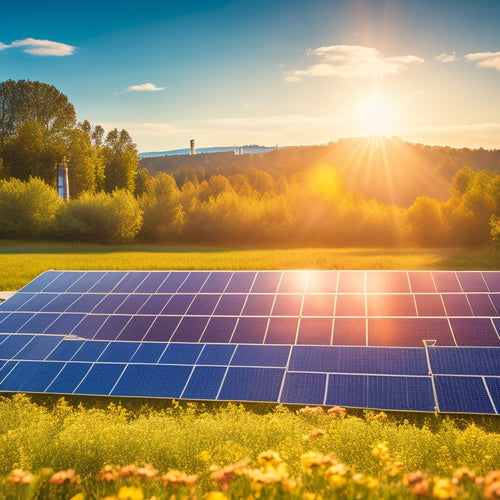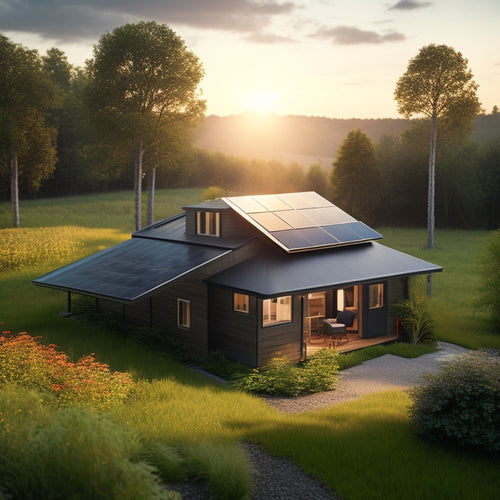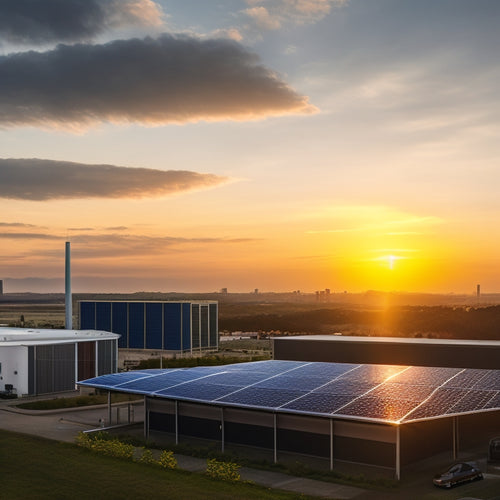
Best Solar Power Equipment for Off-Grid Living
Share
When you're looking for the best solar power equipment for off-grid living, focus on three key components: solar panels, battery storage, and inverters. Start by evaluating your daily energy requirements, then choose efficient solar panels that match your needs. Lithium-ion batteries are ideal for longevity and deeper discharge. Integrating a hybrid inverter can maximize energy capture. Additionally, consider energy-efficient appliances to optimize consumption. This combination guarantees you generate and store enough energy for your lifestyle while minimizing costs and environmental impact. Exploring specific equipment options customized to your situation can further enhance your energy independence.
At a Glance
- Invest in off-grid solar kits for energy independence and long-term savings on utility costs.
- Utilize battery storage solutions like lithium-ion for efficient energy harnessing and prolonged use.
- Assess daily energy needs and prioritize energy-efficient appliances to optimize solar power consumption.
- Consider hybrid solar systems that integrate various power generation methods for enhanced reliability.
- Explore financial incentives, such as tax credits and rebates, to reduce initial investment in solar equipment.
Cost-Effective Energy Solution
Investing in solar power equipment for off-grid living can lead to significant initial savings by reducing your reliance on traditional power sources.
Off-grid solar kits provide energy independence and promote sustainable energy consumption, contributing to overall cost-effectiveness.
Over time, you'll notice a substantial decrease in utility costs, making it a financially smart choice.
This combination of upfront savings and ongoing cost reduction makes solar energy a persuasive option for cost-effective energy solutions for sustainable living.
Initial Investment Savings
When considering solar power equipment for off-grid living, the initial investment can seem intimidating, but it often translates into significant long-term savings. The upfront costs associated with solar panels, inverters, and battery storage can be offset by various financial incentives, making your shift more economically viable.
Federal and state tax credits, rebates, and grants can substantially reduce your initial expenditure, enabling you to utilize the sun's energy without breaking the bank.
Moreover, investing in solar power means you're not just paying for equipment; you're investing in your energy independence. By generating your own electricity, you decrease reliance on traditional energy sources that fluctuate in price, allowing you to budget more effectively.
You can also factor in the decreasing costs of solar technology, which have made these systems more affordable than ever.
Ultimately, while the initial investment might give you pause, the potential for reduced energy bills and the freedom from utility rate hikes can make solar power an attractive option.
Long-Term Utility Reduction
Utilizing solar power for off-grid living can lead to considerable long-term utility reductions, making it a cost-effective energy solution. By capturing the sun's energy, you markedly decrease your reliance on conventional power sources, which can result in lower monthly utility bills and greater financial freedom.
Implementing energy conservation techniques alongside your solar system can amplify these savings. For instance, using energy-efficient appliances and LED lighting reduces your total energy consumption, allowing your solar setup to cover more of your needs.
Additionally, battery storage solutions enable you to store excess energy generated during peak sunlight hours for use during evenings or cloudy days, optimizing your energy use further.
The investment in solar power not only pays off in reduced utility costs but also offers long-term sustainability for your off-grid lifestyle. With the right solar power equipment, you're gaining independence from fluctuating energy prices and the grid itself.
Over time, these savings compound, allowing you to allocate funds to other pursuits that enhance your freedom. Embracing solar energy is more than just a financial decision; it's a step toward a self-sufficient and liberated way of living.
Environmental Impact Reduction
Using solar power greatly lowers your carbon footprint by reducing reliance on fossil fuels.
By utilizing sustainable energy sources, you contribute to a cleaner environment and promote renewable technologies. This not only minimizes ecological damage but also supports the change to a more sustainable energy future.
Additionally, commercial solar installations can lead to noticeable energy bill reductions and enhance property values, further incentivizing the shift toward solar energy.
Lower Carbon Footprint
As you change to off-grid living, you'll considerably lower your carbon footprint by utilizing solar power. By utilizing the sun's energy, you eliminate reliance on fossil fuels, which are major contributors to greenhouse gas emissions. This change not only reduces your impact on the environment but also promotes eco-friendly practices that align with sustainable living.
Solar energy systems effectively provide a carbon offset, as they replace traditional energy sources that pollute the atmosphere. Each kilowatt-hour generated by your solar panels means one less kilowatt-hour produced from fossil fuels, directly decreasing your carbon emissions. This reduction is essential in combating climate change and preserving natural ecosystems.
Moreover, integrating solar power into your daily life enables you to adopt additional eco-friendly practices. You can optimize energy consumption by investing in energy-efficient appliances or using smart technology to manage your energy needs. Each decision you make in this lifestyle alteration contributes to a larger movement towards environmental stewardship.
Ultimately, embracing solar power is more than just a choice; it's a commitment to a cleaner, more sustainable future. By reducing your carbon footprint, you're not only gaining independence but also playing an important role in protecting the planet.
Sustainable Energy Sources
How can sustainable energy sources greatly reduce environmental impacts? By utilizing renewable energy advancements, you can markedly minimize your carbon footprint while achieving energy independence.
Solar power, particularly through recent solar panel innovations, has altered the framework of energy production. These advancements have led to more efficient panels that capture sunlight more effectively, enabling you to generate electricity without the harmful emissions associated with fossil fuels.
Utilizing solar energy not only reduces greenhouse gas emissions but also conserves water, as traditional power plants consume vast amounts for cooling. As you adopt these sustainable methods, you contribute to the preservation of natural ecosystems, ensuring that future generations can enjoy a healthier planet.
Additionally, investing in off-grid solar solutions allows you to break free from conventional energy suppliers, granting you autonomy over your energy needs.
Incorporating these technologies promotes a decentralized energy model that enables individuals like you to control their energy production. By choosing sustainable energy sources, you're not just reducing environmental impacts; you're also participating in a broader movement toward a more resilient and sustainable future.
Welcome these innovations, and you'll pave the way for a cleaner, more independent lifestyle.
Unique System Configurations
When considering unique system configurations for off-grid solar power, hybrid solar solutions and battery storage options stand out as critical components.
Incorporating various battery types, such as lithium-ion or deep cycle batteries, can greatly impact your system's performance and longevity. You can optimize your energy independence by integrating various power sources and efficiently managing energy storage.
Understanding the cost breakdown of battery systems will help you tailor a system that meets your specific needs and enhances overall efficiency.
Hybrid Solar Solutions
Hybrid solar solutions offer a versatile approach to off-grid energy needs, combining various power generation methods to maximize efficiency and reliability. By integrating different solar panel types—such as monocrystalline, polycrystalline, and thin-film—with hybrid inverters, you can optimize energy capture and usage customized to your specific lifestyle.
This configuration allows you to utilize solar energy during the day while also utilizing alternative energy sources like wind or backup generators when needed.
With hybrid systems, you can easily switch between energy sources, ensuring you always have power available regardless of weather conditions or time of day. Hybrid inverters facilitate this seamless shift, converting and managing energy from multiple inputs, which enhances overall system efficiency.
Moreover, these unique configurations not only provide energy independence but also reduce reliance on traditional grid power, enabling you to live freely and sustainably.
As you investigate hybrid solar solutions, consider your specific power requirements and the potential for incorporating various energy sources. This strategic approach can lead to a more resilient and adaptable off-grid energy system, allowing you to enjoy the freedom of self-sufficiency.
Battery Storage Options
Battery storage is an essential component of any off-grid solar power system, enabling you to harness and store energy generated during sunny days for use at night or during periods of low sunlight.
When considering battery storage options, you'll typically choose between lead acid batteries and lithium ion batteries, each offering unique advantages.
Lead acid batteries are often the more affordable option upfront. They're durable and reliable, suited for systems where budget constraints are a priority.
However, they've a shorter lifespan and lower depth of discharge, limiting your usable capacity.
On the other hand, lithium ion batteries provide superior efficiency and longevity. They can discharge deeper, allowing you to use more of your stored energy without damaging the battery.
While they've a higher initial cost, their longer lifespan and reduced maintenance requirements can lead to overall savings in the long run.
When designing your off-grid system, consider the specific energy needs and budget constraints.
Evaluating these battery types will enable you to create a unique system configuration that maximizes your energy independence and enhances your off-grid living experience.
Assess Your Energy Requirements
To effectively set up your off-grid solar system, you need to calculate your daily energy needs and identify essential appliances.
Start by listing all devices you plan to use and their energy consumption in watt-hours. This breakdown allows you to tailor your solar equipment to meet your specific energy demands efficiently.
Additionally, consider implementing energy-efficient upgrades like LED bulbs and low-flow fixtures to further optimize your energy usage while utilizing solar energy potential utilizing solar energy potential.
Calculate Daily Energy Needs
Evaluating your daily energy needs is essential for designing an effective off-grid solar power system. Start by gauging your overall energy consumption. This involves taking stock of all devices and appliances you plan to use. Create a list of these items, noting their wattage and average daily usage hours.
Next, analyze your usage patterns. Consider the peak times when you'll need the most energy. For example, if you run power tools during the day, you'll need to make sure your system can support that demand while also powering essential devices like lights and refrigerators.
Once you've compiled this information, calculate your total daily energy requirements in watt-hours. Multiply the wattage of each device by the number of hours you plan to use it daily, then sum these values. This total will guide you in determining the size of your solar panels and battery storage capacity.
Understanding your daily energy needs not only helps you design a customized solar power system but also enables you to live more sustainably and independently.
Identify Essential Appliances
When evaluating your energy requirements, identifying essential appliances is key for optimizing your off-grid solar power system. Start by listing all the appliances you plan to use, categorizing them into necessary and non-essential.
Focus first on solar appliances that directly impact your daily living—like refrigerators, lights, and cooking devices.
Next, calculate the energy consumption of each appliance. This involves checking wattage ratings and estimating usage hours daily. Combine these figures to develop a thorough overview of your total energy needs.
Remember, power management is critical; it's not just about having the right equipment, but also about using it wisely.
Prioritize energy-efficient models when selecting solar appliances, as these will directly reduce your energy consumption and improve the effectiveness of your solar system.
Consider using timers or smart controls to optimize usage patterns, ensuring you draw power when it's most available.
Higher Energy Independence Potential
Achieving higher energy independence means you'll have greater control over your energy resources and costs.
By investing in solar power equipment, you can considerably reduce your reliance on external energy sources, which enhances your self-sufficiency.
This shift not only provides financial savings but also increases your resilience against power outages and fluctuating energy prices.
Energy Self-Sufficiency Benefits
A significant advantage of off-grid living is the heightened energy independence it offers. By utilizing solar power, you can cultivate a self-sustaining lifestyle that reduces reliance on external energy sources. This autonomy not only strengthens you but also enhances your resilience against fluctuating energy markets and supply disruptions.
Here's a quick comparison of energy self-sufficiency benefits:
| Benefit | Description |
|---|---|
| Reduced Utility Bills | You'll save money by generating your own energy. |
| Environmental Impact | Minimizing reliance on fossil fuels lowers your carbon footprint. |
| Emergency Preparedness | In a crisis, you'll have a reliable energy source. |
| Increased Property Value | Off-grid capabilities can enhance your property's appeal. |
Investing in solar power equipment allows you to fully seize this energy independence. By generating your own energy, you're not just taking control of your power needs; you're also participating in a movement towards sustainable living. In turn, this can lead to a more fulfilling lifestyle where you dictate your energy sources, contributing positively to both your finances and the environment. Seize this freedom and make energy self-sufficiency a reality.
Frequently Asked Questions
What Is the Lifespan of Solar Panels for Off-Grid Systems?
The lifespan of solar panels typically ranges from 25 to 30 years. You'll notice solar panel efficiency declines gradually, averaging around 0.5% to 1% annual solar panel degradation, ensuring reliable energy for your off-grid needs.
How Do I Maintain My Solar Power Equipment?
To maintain your solar power equipment, regularly clean solar panels to guarantee efficiency and check battery maintenance by monitoring charge levels and connections. This proactive approach maximizes performance and extends the lifespan of your system.
Can Solar Power Work in Winter Conditions?
Snowflakes dance on panels, but solar power thrives even in winter. Though solar efficiency may dip, modern systems guarantee decent winter performance. With proper positioning and maintenance, you can utilize energy year-round, embracing true freedom.
What Are the Best Battery Options for Off-Grid Solar Systems?
When choosing battery options for off-grid solar systems, consider lithium batteries for efficiency and longevity, while lead acid offers affordability. Each type has unique benefits, so assess your energy needs and budget before deciding.
Do I Need Permits for Installing Solar Panels Off-Grid?
Imagine sailing into uncharted waters; you'll need to know the permit requirements before you set sail. Always check local installation guidelines, as they vary. Freedom comes with responsibility, so guarantee compliance to enjoy your expedition.
Explore More
To summarize, investing in the best solar power equipment for off-grid living not only enhances your energy independence but also paves the way for a greener future. By carefully evaluating your energy needs and exploring unique system configurations, you're not just utilizing the sun's power; you're seizing control of your energy destiny. Like a well-tuned orchestra, each component plays an essential role in creating a harmonious balance between sustainability and self-sufficiency. Adopt the shift to solar today.
Related Posts
-

Advantages of Solar Generating Systems Over Traditional Energy
Solar generating systems provide several key advantages over traditional energy sources. You'll experience lower long...
-

Diy Off Grid Solar
By embracing DIY off-grid solar, you can break free from grid dependence, slashing your energy bills by up to 90% and...
-

Advantages of Commercial Solar Battery On-Site Storage
By investing in a commercial solar battery on-site storage system, you can greatly reduce your energy grid dependence...


